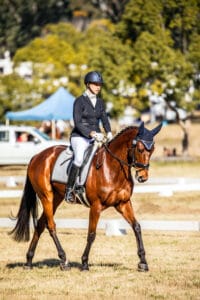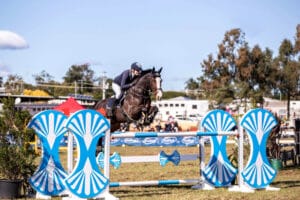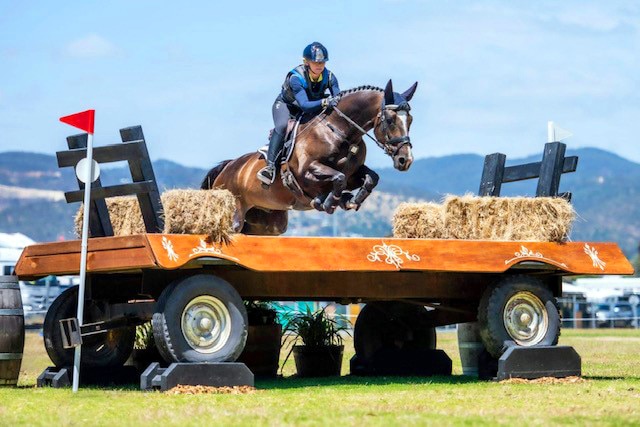Racing Queensland is making major inroads with their off the track program for retired Thoroughbred and Standardbred horses, writes JO MCKINNON.
Racing Queensland has launched a number of significant initiatives during the past 12 months. In mid-2021 the Queensland Off-The-Track (QOTT) Program unveiled a plan to allow new off the track owners access to free instruction and individual support across a range of horse husbandry areas.
The lessons cover nutrition, groundwork, general horse care, behaviour and ridden work. This holistic approach has proved to be a huge part of the program’s success, its popularity underscored by extremely positive feedback from the participants.
Eligible for 10 lessons awarded through a voucher system, successful applicants can choose from 37 QOTT Approved Coaches. The coaches are all Equestrian Australia accredited and are located right across Queensland.
Kim Duffy, Racing Queensland’s Senior Animal Care Manager, says 345 horses have so far taken part in the program and the high lesson uptake will benefit both horses and riders: “We have a variety of students in the program, from riders and owners who want to learn about feeding, nutrition and handling, to those who want to transition a horse from the racetrack to domestic life. We also cater for riders interested in many equestrian disciplines such as dressage and show jumping, so a wide range of people are participating.”
Kim, a former track work rider, competitive eventer and qualified veterinary technician, has led the development and implementation of the QOTT Program since July 2021. Much has been achieved in only a short period of time. “It’s been very busy since we’ve been up and running, with another busy couple of years to come,” she says. “It’s a dream job to be honest. I grew up riding off the track horses and fell in love with the breed. I’ve never owned or ridden another breed since.”
Another initiative of which Kim is justifiably proud is the Acknowledged Retrainers Program, which has been in place since January. Developed in direct response to the Martin Inquiry, the program is one of a suite funded by the prize money levy implemented to support equine welfare in Queensland, and is designed to facilitate a high-quality first transition for Thoroughbred and Standardbred horses.
The process of becoming an Acknowledged Retrainer is thorough, with selection based on the retrainer’s ability and experience in dealing with Thoroughbred and Standardbred horses of all abilities and temperaments. Part of the retrainer’s role is to objectively assess the suitability and character of each horse, and provide the education and retraining necessary for them to successfully find their forever home. Both the retraining and rehoming program are tailored to suit the individual requirements of each horse.

Alice Cooper graduated from the 2021 QOTT Subsidised Lessons program and recently rode Husson’s Pride in his first ever event (Image by Blue Ribbon Photography).
Currently QOTT has 13 Acknowledged Retrainers and in the four months since the program has been running, they have successfully rehomed 10 horses and have 11 horses in training.
Acknowledged Retrainers also assist prospective buyers in the selection of a retired racehorse suitable for their level of experience and intended use. Kim is very happy with the retrainers’ results so far: “They’ve been amazing. The feedback we have received not only from industry participants but also the new owners has been overwhelmingly positive.”
Potential retrainers are carefully scrutinised prior to being approved. After their expression of interest is received, a rigorous application process begins: “Interested retrainers must fill out an application form with written references from a number of key people including vets, accredited coaches, people who have purchased horses from them in the past and licensed trainers they’ve worked with from the racing industry,” Kim explains. “We then review the applications before they progress to a property site assessment, where things like fencing, water supply, feed storage and the welfare of horses on their property are all checked. If successful, they enter an agreement which sets out their equine welfare and retraining obligations.”

A QOTT Acknowledged Retrainer, Gemma Creighton competes nationally and internationally on state and national teams up to World Cup Level (Image by Calico Pony).
Retrainers are provided with business, marketing and financial support, including an equine care subsidy that reimburses them for veterinary, farrier, worming, vaccination and dental costs.
The current retrainers have different models of operation, and generally prefer to take on full ownership of a retired racehorse so they can retrain and rehome them in their own time. Several have also elected to retrain under contract.
A range of other exciting initiatives are set to be launched by QOTT in the coming months, including an off the track grants program to support not-for-profit organisations and charities that provide a lifelong safety net for retired racehorses. “There’re a lot of wonderful organisations, rescue groups and sanctuaries who take
on vulnerable and at-risk horses at later stages of their lives and we want to support them as much as we can,” Kim says.
An online education hub with information on how to care for and educate retired racehorses will also soon be accessible to the public, and will include fact sheets and articles written by professionals and industry experts, including qualified veterinarians. A QOTT official Facebook page is also set to go live in the coming weeks.
To learn more about the program and its initiatives visit QOTT
Queensland Elite Eventing Squad member Tanya Schmidt is a QOTT Acknowledged Retrainer passionate about assisting OTT horses to transition into their new lives (Image by Britt Grovenor).



